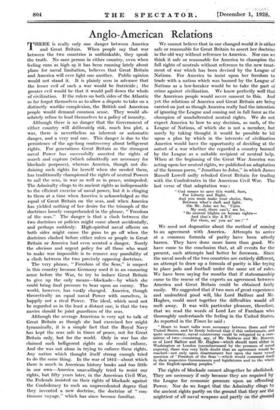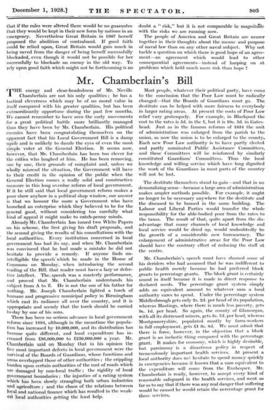Anglo-American- Relations
THERE is really only one danger between America and Great Britain. When people say that war between the two countries is unthinkable, they speak the truth. No sane person in either country, even when feeling runs- as high a; it has been running lately about plans for naval limitation, believes that Great Britain and America will ever fight one another. Public opinion would not stand it. It is plainly seen in advance that the lesser evil of such a war would be fratricide ; the greater evil would be that it would pull down the whole of civilization. If the rulers on both sides of the Atlantic so far forgot themselves as to allow a dispute to take on a distinctly warlike complexion, the British and American people would demand common sense. They would ab- solutely refuse to lend themselves to a policy of insanity.
Although there is no danger that the Govermiaent of either country will deliberately risk, much less plot, a war, there is nevertheless an inherent or automatic danger, and a very real one. This danger is due to the persistence of the age-long controversy about belligerent rights. For generations Great Britain as the strongest naval Power has successfully asserted the rights of 'search and capture (which admittedly are necessary for blockade purposes), whereas America, though not dis- daining such rights for herself when' she needed then, has traditionally championed the rights of neutral Powers to sail the seas, in war as well as in peace, unimpeded. The Admiralty clings to its ancient rights as indispensable to the efficient exercise of naval power, but it is clinging to them at a time when America is acknowledged as the equal of Great Britain on the seas, and when America has yielded nothing of her desire for the triumph of the doctrines loosely comprehended in the phrase, " Freedom of the seas." The danger is that a clash between the two doctrines or policies might come about accidentally, and perhaps suddenly. High-spirited naval officers on both sides might cause the guns to go off when the doctrines clashed before either rulers or people in Great Britain or America had even scented a danger. Surely the obvious and urgent policy for all those who want 'to make war impossible is to remove any possibility of a clash between the two precisely opposing doctrines.
The very phrase, " Freedom of the Seas," is suspect in this country because Germany used it in an ensnaring sense before the War, to try to induce Great Britain to give up the only means—blockade—by which she could bring final pressure to bear upon an enemy. The world, however, has vastly changed. America, though -theoretically an equal naval Power with ourselves, is happily not a rival Power. The ideal, which need not be regarded as in the least a distant one, is that the two navies should be joint guardians of the seas.
Although the average American is very apt to talk of Great Britain as though she had exercised her might tyrannically, it is a simple fact that the Royal Navy has kept the seas safe in times of peace, not for Great Britain only, but for the world. Only in war has she claimed such belligerent rights as she could enforce. And she was not alone in trying to enforce these rights. Any nation which thought itself strong enough tried to do the same thing. In the war of 1812—about which there is much in American history books and too little in our own--4merica unavailingly tried to resist our rights, but fifty, years later, in the 'American Civil War, the Federals insisted on their rights of blockade against the Confederacy to such an unprecedented degree that they invented a new doctrine, the doctrine of " con- tinuous voyage," which has since become familiar. We cannot believe that in our changed‘world it-is oithgr safe or reasonable for Great Britain to assert her doctrine in the old way without reference to America. Nor can we think it safe or reasonable for America to champion the full rights of neutrals without reference to the new treat- ment of war which has been devised by the League of Nations. For America to insist upon her freedom to trade with a nation which was banned by the League of Nations as a law-breaker would be to take the part of crime against civilization. We know perfectly well that the American people would never consent to this. And yet the relations of America and Great Britain are being carried on just as though America really had the intention of ignoring the League and coming Out in full force as the champion of unadulterated neutral rights. We do not expect America to bow to any decision, as such, of the League of Nations, of which she is not a member, but surely by taking thought it would be possible to ha upon a plan by which in the interests of civilization America would have the opportunity of deciding at the outset of a war whether she regarded a country banned by the League as a suitable recipient of neutral help. When at the beginning of the Great War America was acting upon her neutral rights, we published an adaptation of the famous poem, " Jonathan to John," in which James Russell Lowell sadly rebuked Great Britain for trading with the Confederates in the American Civil War. The last verse of that adaptation was :
" God means to save this world, Sam, For Liberty and Right, And you must make your choice, Samt Between what's dark and light.
Ole Mr. John sez he, ` TTpon My soul, there can't,' sez he,
' Be neutral blights on human rights—
And that's the A B C For them, an' you an' me !' "
We need not dogmatize about the method of coming to an agreement with America. Attempts to arrive at a common formula of parity have been utterly barren. They have done more harm than good. We have come to the conclusion that, at all events for the present, such attempts had better be forsworn. Since the naval needs of the two countries are entirely different, an attempt to draw up a formula of parity is like trying to place polo and football under the same set of rules. We have been 'saying for months that if statesmanship came to the rescue of the experts an agreement between America and Great Britain could be obtained fairly easily. We suggested that if two men of great experience and undoubted good will, like Lord Balfour and Mr. Hughes, could meet together the difficulties would all melt away. It was with particular pleasure, therefore, that we read the words of Lord Lee of Fareham who thoroughly understands the feeling in the United States. As reported in the Times he said :
" Heart to heart talks were necessary between them and the United States, and he firmly believed that if this unfortunate, and quite unnecessary, naval controversy could be relegated to a com- mittee of two—consisting, say, of Mr. Baldwin and Mr. Hoover,
or of Lord Balfour and Mr. Hughes which should meet either in
Washington or London (unembarrassed by the pressure of naval experts), there was very little doubt that an agreement would be reached—not only upon disarmament but upon the more vexed question of ' Freedom of the Seas '—which would commend itself to their respective Governments and legislatures and to the whole of the English-speaking peoples."
The rights of blockade cannot altogether be abolished. They are necessary if only because they are required by the League for economic pressure upon an offending Power. Nor do we forget that the Admiralty clings t9 the ancient rights partly on the ground that they are the mightiest of all naval weapons and partly on the &mind that if the rules were altered there would be-no guarantee- that they would be kept in their new form by nations in an emergency. Nevertheless Great Britain, in 1907 herself proposed the abolition of contraband. If good faith could be relied upon, Great Britain would gain much in being saved from the danger of being herself successfully blockaded, even though it would not be possible for her successfully to blockade an enemy in the old way. To rely upon good faith which might not be forthcoming is no doubt a " risk," but it is not comparable -in- magnitude with the risks we are running now.
The people of America and Great Britain are nearer together in their thoughts about the means and purpose of naval law than on any other naval subject. Why not tackle a question on which there is good hope of an agree- ment—an agreement which would lead to other consequential agreements—instead of harping on at problems which hold much more risk than hope ?









































 Previous page
Previous page